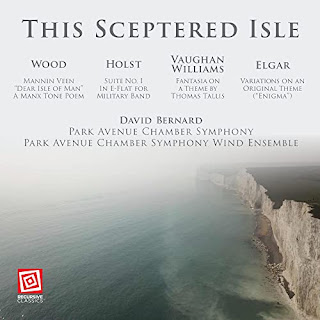So when a new volume of English works of the period arrived at my doorstep the other day, I was glad to see it. It is entitled This Sceptered Isle (Recursive Classics RC5946217) and features the New York based Park Avenue Chamber Symphony and the Park Avenue Chamber Symphony Wind Ensemble, both under the very capable musical directorship of David Bernard.
The program is a balanced selection of two staunchly admired examples of the current standard repertoire, namely Vaughan Williams' "Fantasia on a Theme by Thomas Tallis" and Elgar's perennial "Variations on an Original Theme Op. 36 'Enigma'". These are contrasted by two sympathetically treated works a bit less known these days, namely Haydn Wood's "Maunin Veen--'Dear Isle of Man'--A Manx Tone Poem," and Gustav Holst's "Suite No.1 in E-flat for Military Band, Op. 28A."
What the Park Avenue outfit lack in a finished polish they make up for with an articulated enthusiasm that befits the kind of populist earthiness of the music. In this way you might imagine how the premiere performances of these works might have sounded, as something excitingly NEW.
And so also it befits the homespun local and sometimes folkish thrust of the music, especially in my thinking the Wood and Holst works.
The swelling harmonic poignancy of the Vaughn Williams "Fantasia" sounds granularly soaring as well it should. The Elgar "Enigma Variations" has a kind of immediacy that suits the work quite well and every detail is firmly supported by the sureness of sequentiality as is a must for such variations.
And if there are some occasional imperfections in the totality, if sometimes the intonation has a moment or two of slight uncertainty, at the same time this is heartwarming in its singular devotion to making all come alive. There may be better performances of the Elgar and Vaughan Williams out there, but the Wood and Holst works are in scarce supply and these versions give us the whole cloth of where they move into, what a sublime transformation of local strains into the style of Modern Anglo-Symphonism. And as a whole these four works sound like they belong together because they do, they play off against one another and help you understand the parameters of the stylistics then.
And in the end I do recommend this one for its respectable readings of Anglo gems and other works deserving our attention. Hear hear!

No comments:
Post a Comment